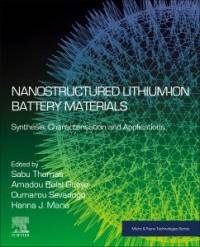Nanostructured Lithium-Ion Battery Materials
- Indbinding:
- Paperback
- Sideantal:
- 700
- Udgivet:
- 1. september 2024
- 2-4 uger.
- 15. maj 2025
På lager
Normalpris
Abonnementspris
- Rabat på køb af fysiske bøger
- 1 valgfrit digitalt ugeblad
- 20 timers lytning og læsning
- Adgang til 70.000+ titler
- Ingen binding
Abonnementet koster 75 kr./md.
Ingen binding og kan opsiges når som helst.
- 1 valgfrit digitalt ugeblad
- 20 timers lytning og læsning
- Adgang til 70.000+ titler
- Ingen binding
Abonnementet koster 75 kr./md.
Ingen binding og kan opsiges når som helst.
Beskrivelse af Nanostructured Lithium-Ion Battery Materials
Nanostructured Lithium-ion Battery Materials: Synthesis and Applications provides a detailed overview of nanostructured materials for application in Li-ion batteries, supporting improvements in materials selection and battery performance. The book begins by presenting the fundamentals of Lithium-ion batteries, including electrochemistry and reaction mechanism, advantages and disadvantages of Li-ion batteries, and characterization methods. Subsequent sections provide in-depth coverage of a range of nanostructured materials as applied to cathodes, electrolytes, separators, and anodes. Finally, other key aspects are discussed, including industrial scale-up, safety, life cycle analysis, recycling, and future research trends. This is a valuable resource for researchers, faculty, and advanced students across nanotechnology, materials science, battery technology, energy storage, chemistry, applied physics, chemical engineering, and electrical engineering. In an industrial setting, this book will be of interest to scientists, engineers, and R&D professionals working with advanced materials for Li-ion batteries and other energy storage applications.
Brugerbedømmelser af Nanostructured Lithium-Ion Battery Materials
Giv din bedømmelse
For at bedømme denne bog, skal du være logget ind.
Find lignende bøger
Bogen Nanostructured Lithium-Ion Battery Materials findes i følgende kategorier:





















